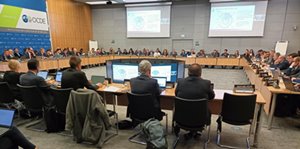Regional, rural and urban development
Regional Development Policy Committee
ABOUT USEstablished in 1999, the OECD Regional Development Policy Committee (RDPC) designs and implements effective place-based policies to improve living standards and well-being for citizens across all regions, cities, and rural areas. It provides internationally comparable subnational data to inform global debates on policy, finance, and governance. The Committee meets twice yearly with relevant ministries and organizations to develop a vision of place-based, multi-level, and multi-sectoral regional development policy. Since its creation, the Committee has informed many global debates and is a leading forum for high-level policymakers. The RDPC has subsidiary bodies/groups and international networks that advance the place-based debate:
In addition, approximately every five years, the RDPC holds a meeting at ministerial level, bringing together Ministers responsible for regional and urban development and territorial reforms to discuss current challenges. |
|
Programme of WorkThe work of the RDPC and its subsidiary bodies over 2023-24 is carried out under three pillars of work:
|
Contact |
Related Documents
